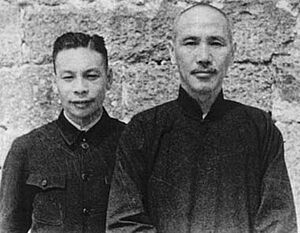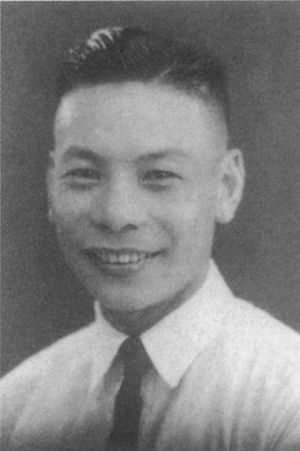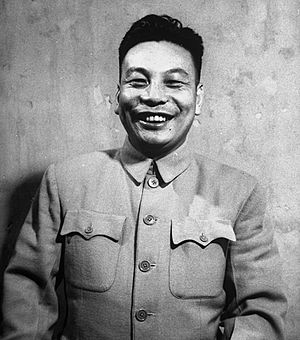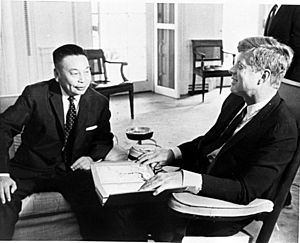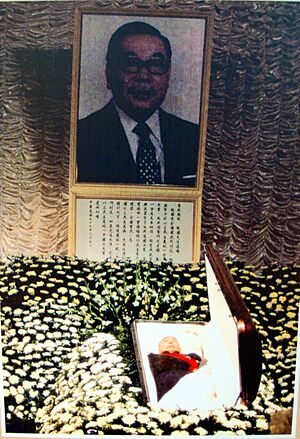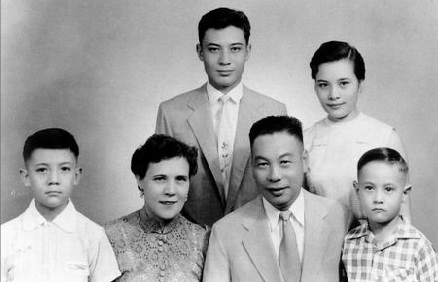Chiang Ching-kuo facts for kids
Quick facts for kids
Chiang Ching-kuo
|
|||||||||||||||||||||||||||||||||||||||||||||||||
|---|---|---|---|---|---|---|---|---|---|---|---|---|---|---|---|---|---|---|---|---|---|---|---|---|---|---|---|---|---|---|---|---|---|---|---|---|---|---|---|---|---|---|---|---|---|---|---|---|---|
|
蔣經國
|
|||||||||||||||||||||||||||||||||||||||||||||||||
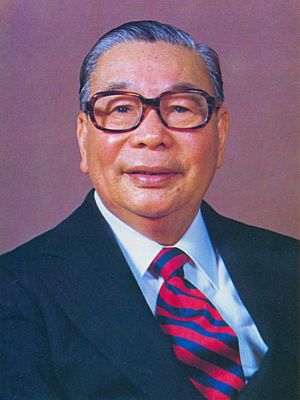
Official portrait, 1985
|
|||||||||||||||||||||||||||||||||||||||||||||||||
| President of the Republic of China | |||||||||||||||||||||||||||||||||||||||||||||||||
| In office 20 May 1978 – 13 January 1988 |
|||||||||||||||||||||||||||||||||||||||||||||||||
| Premier | Hsu Ching-chung (acting) Sun Yun-suan Yu Kuo-hwa |
||||||||||||||||||||||||||||||||||||||||||||||||
| Vice President | Hsieh Tung-min Lee Teng-hui |
||||||||||||||||||||||||||||||||||||||||||||||||
| Preceded by | Yen Chia-kan | ||||||||||||||||||||||||||||||||||||||||||||||||
| Succeeded by | Lee Teng-hui | ||||||||||||||||||||||||||||||||||||||||||||||||
| Premier of the Republic of China | |||||||||||||||||||||||||||||||||||||||||||||||||
| In office 29 May 1972 – 20 May 1978 |
|||||||||||||||||||||||||||||||||||||||||||||||||
| President | Chiang Kai-shek Yen Chia-kan |
||||||||||||||||||||||||||||||||||||||||||||||||
| Vice Premier | Hsu Ching-chung | ||||||||||||||||||||||||||||||||||||||||||||||||
| Preceded by | Yen Chia-kan | ||||||||||||||||||||||||||||||||||||||||||||||||
| Succeeded by | Hsu Ching-chung (acting) | ||||||||||||||||||||||||||||||||||||||||||||||||
|
|||||||||||||||||||||||||||||||||||||||||||||||||
| Personal details | |||||||||||||||||||||||||||||||||||||||||||||||||
| Born | 27 April 1910 Fenghua, Zhejiang, Qing dynasty |
||||||||||||||||||||||||||||||||||||||||||||||||
| Died | 13 January 1988 (aged 77) Taipei Veterans General Hospital, Taipei, Taiwan |
||||||||||||||||||||||||||||||||||||||||||||||||
| Resting place | Touliao Mausoleum, Daxi District, Taoyuan, Taiwan | ||||||||||||||||||||||||||||||||||||||||||||||||
| Nationality | |||||||||||||||||||||||||||||||||||||||||||||||||
| Political party | Kuomintang | ||||||||||||||||||||||||||||||||||||||||||||||||
| Spouse |
Faina Vakhreva
(m. 1935) |
||||||||||||||||||||||||||||||||||||||||||||||||
| Children | Chiang Hsiao-wen (1935–1989) Chiang Hsiao-chang (born 1938) Chang Hsiao-tzu (1941–1996) Chiang Hsiao-yen (born 1942, illegitimate, disputed) Winston Chang (1942-1996, illegitimate, disputed) Chiang Hsiao-wu (1945–1991) Chiang Hsiao-yung (1948–1996) |
||||||||||||||||||||||||||||||||||||||||||||||||
| Alma mater | Moscow Sun Yat-sen University | ||||||||||||||||||||||||||||||||||||||||||||||||
| Occupation | Politician | ||||||||||||||||||||||||||||||||||||||||||||||||
| Signature |  |
||||||||||||||||||||||||||||||||||||||||||||||||
| Military service | |||||||||||||||||||||||||||||||||||||||||||||||||
| Allegiance | Republic of China | ||||||||||||||||||||||||||||||||||||||||||||||||
| Branch/service | Republic of China Army | ||||||||||||||||||||||||||||||||||||||||||||||||
| Years of service | 1937—1968 | ||||||||||||||||||||||||||||||||||||||||||||||||
| Rank | |||||||||||||||||||||||||||||||||||||||||||||||||
| Chiang Ching-kuo | |||||||||||||||||||||||||||||
|---|---|---|---|---|---|---|---|---|---|---|---|---|---|---|---|---|---|---|---|---|---|---|---|---|---|---|---|---|---|
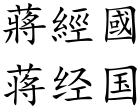
"Chiang Ching-kuo" in Traditional (top) and Simplified (bottom) Chinese characters
|
|||||||||||||||||||||||||||||
| Traditional Chinese | 蔣經國 | ||||||||||||||||||||||||||||
| Simplified Chinese | 蒋经国 | ||||||||||||||||||||||||||||
|
|||||||||||||||||||||||||||||
Chiang Ching-kuo (born April 27, 1910 – died January 13, 1988) was an important politician in the Republic of China. He was the oldest son of Generalissimo Chiang Kai-shek. Chiang Ching-kuo held many government jobs. He served as premier of the Republic of China from 1972 to 1978. Later, he became president of the Republic of China from 1978 until his death in 1988.
As a teenager in 1925, Chiang Ching-kuo went to study in the Soviet Union. This was when his father's Nationalist Party and the Chinese Communist Party were working together. He learned to speak Russian very well. When the Nationalists and Communists became enemies, he worked in a steel factory. There, he met and married Faina Vakhreva. In 1937, with war coming between China and Japan, he returned to China. His father gave him more and more important jobs.
After Japan surrendered, Chiang Ching-kuo worked to stop corruption in Shanghai. When the Communists won the Chinese Civil War in 1949, the Chiang family and their government moved to Taiwan. In Taiwan, he first led the security forces until 1965. He then became Minister of Defense (1965–1969), Vice-Premier (1969–1972), and Premier (1972–1978). After his father passed away in 1975, he became the leader of the Kuomintang (KMT) party. He was elected president in 1978 and again in 1984.
During his time as president, Taiwan's government became more open. He worked to include more Taiwanese people in government roles. Towards the end of his life, he made big changes. He allowed more freedom of speech and relaxed controls on the media. He also ended martial law in 1987. These changes helped Taiwan become a more democratic country. He is remembered for helping Taiwan's economy grow and for fighting corruption.
Contents
Biography
Early Life and Education
Chiang Ching-kuo was born in Fenghua, Zhejiang. His parents were Chiang Kai-shek and his first wife, Mao Fumei. He had an adopted brother named Chiang Wei-kuo. His name "Ching-kuo" means "longitude of the nation." This name suggests someone with great skills in leading a country.
Young Ching-kuo had a good relationship with his mother and grandmother. However, his relationship with his father was very strict. His father wanted him to improve his Chinese writing. From 1916 to 1919, he went to school in Wushan. In 1920, his father hired teachers to teach him important Chinese texts.
In 1924, Chiang Ching-kuo suggested a plan to help people in rural areas. He wanted to offer free education so people could learn to read and write. In 1925, he went to Pudong College in Shanghai. Later, he moved to Beijing to attend a school run by his father's friend, Wu Zhihui. There, he became interested in revolutionary ideas. He decided he wanted to study in Moscow.
His father, Chiang Kai-shek, was not very happy about this idea at first. But he eventually agreed. In the summer of 1925, Chiang Ching-kuo went to the Whampoa Military Academy to talk with his father. He then traveled to Moscow later that year.
Time in the Soviet Union
Chiang Ching-kuo lived in the Soviet Union for almost 12 years. He was given the Russian name Nikolai Vladimirovich Elizarov. He studied at the Communist University of the Toilers of the East. His classmates included important future leaders like Deng Xiaoping. Chiang Ching-kuo became very interested in Communist ideas.
In April 1927, his father, Chiang Kai-shek, turned against the Communists in China. Chiang Ching-kuo wrote an article criticizing his father's actions. After this, he was kept in the Soviet Union. He was sent to work in a steel factory in the Ural Mountains. There, he met Faina Ipat'evna Vakhreva, who was from Belarus. They got married on March 15, 1935. She later took the Chinese name Chiang Fang-liang. Their son, Hsiao-wen, was born in December of that year.
His father refused to trade him for a Communist leader. He believed the country's interests were more important than his son's return.
Return to China and World War II
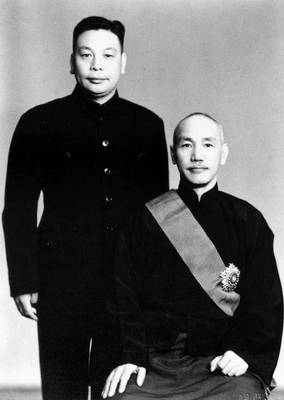
In April 1937, after 12 years, Chiang Ching-kuo returned to China with his wife and son. At this time, China was preparing to fight against Japan. His father wanted to work with the Communists to fight the Japanese invasion.
When he returned, his father assigned a tutor to help him adjust to life in China. Chiang Ching-kuo was put in charge of the Gannan Prefecture from 1939 to 1945. He worked to fight corruption and illiteracy there. He also helped the economy grow. His work was called the "Gannan New Deal." He set up a "public information desk" where people could come to him with their problems.
Because of the war, many children were left without homes. In 1942, Chiang Ching-kuo started the Chinese Children's Village outside Ganzhou. It had places like a nursery, school, and hospital. During these years, he met Wang Sheng, who became a close friend.
While in mainland China, Chiang and his wife had a daughter, Hsiao-chang (born 1938), and two more sons, Hsiao-wu (born 1945) and Hsiao-yung (born 1948).
Economic Work in Shanghai
After World War II, during the Chinese Civil War, Chiang Ching-kuo worked in Shanghai. He tried to stop corruption and high prices that were hurting the city. He wanted to help the Nationalists gain more support.
He tried to control prices and arrest dishonest business people. He even arrested the son of a powerful gangster. He also ordered raids on warehouses owned by important families accused of hoarding goods. However, these efforts faced strong resistance. Eventually, Chiang Ching-kuo resigned from this role.
Political Career in Taiwan
When the Nationalists lost mainland China to the Communists, Chiang Ching-kuo moved with his father to Taiwan. In 1949, the Nationalist capital moved to Taipei.
In 1950, his father made him the director of the security forces. He held this position until 1965. He also helped reorganize the military in a way similar to the Soviet system. In 1955, he was involved in the arrest of General Sun Li-jen, a Chinese war hero. General Sun remained under house arrest until Chiang Ching-kuo's death.
From 1955 to 1960, Chiang oversaw the building of Taiwan's highway system. His father gave him more important roles. He became the ROC Defense Minister from 1965 to 1969. He was then Vice Premier from 1969 to 1972. During this time, he survived an assassination attempt in 1970 while visiting the U.S. After that, he became the nation's Premier from 1972 to 1978.
As his father grew older, Chiang Ching-kuo took on more responsibilities. When his father died in 1975, Chiang Ching-kuo became the leader of the KMT party.
Presidency
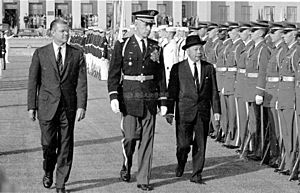
Chiang Ching-kuo was elected president of the Republic of China in 1978. He was reelected in 1984. During his presidency, Taiwan's government, while still strong, became more open. He started to allow more political discussion. He also chose Lee Teng-hui, a Taiwan-born leader, to be his vice-president. This paved the way for Lee to become president later.
He launched major building projects like the "Ten Major Construction Projects." These projects helped Taiwan's economy grow very quickly. Taiwan saw a 13% growth rate and became a strong economic power. He also made important changes to protect workers' rights in the 1970s and 1980s. These changes covered things like child labor, women's employment, and working hours. Workers' salaries tripled under his leadership.
On July 15, 1987, Chiang Ching-kuo finally ended martial law in Taiwan. This was a very important step towards democracy. He also allowed people to visit mainland China and lifted bans on travel to Hong Kong and Macau. Even though opposition political parties were still officially illegal, they were allowed to operate. When the Democratic Progressive Party was formed in 1986, President Chiang chose not to stop them. Instead, their candidates ran in elections as independents.
Chiang Ching-kuo also gave more political power to people born in Taiwan. This helped prepare Taiwan for a more democratic future.
Death and Legacy
Chiang Ching-kuo passed away on January 13, 1988, at the age of 77. He died from a heart attack. In his last months, he used a wheelchair and had health problems like diabetes.
He was buried temporarily in Daxi Township. The plan was to eventually bury him and his father in their birthplace in mainland China. However, this has not happened.
Many people in Taiwan remember Chiang Ching-kuo very positively. They praise his work for Taiwan's economy and society. They also appreciate his efforts to bring democracy to the island. He is often seen as one of Taiwan's best presidents.
Memorials
Road Names
- Jingguo road (in Hsinchu)
- Jingguo road (in Taoyuan)
The Republic of China Air Force
The AIDC, Taiwan's air defense company, named its AIDC F-CK Indigenous Defense Fighter the Ching Kuo in his honor.
Coin
- On April 27, 2010, a coin was made to celebrate the 100th anniversary of Chiang Ching-kuo's birth.
Song
- Chiang Ching-kuo Memorial Song
Family
- Wife: Faina Chiang Fang-liang. They had 3 sons and 1 daughter.
- First son: Alan Chiang Hsiao-wen (1935–1989)
- Chiang Yu-mei (born 1961)
- First daughter: Chiang Hsiao-chang (born 1938)
- Theodore Yu Tsu-sheng
- Second son: Alex Chiang Hsiao-wu (1945–1991)
- Alexandra Chiang Yo-lan
- Johnathan Chiang Yo-sung (married 2002)
- a daughter (born 2003)
- Third son: Eddie Chiang Hsiao-yung (1948–1996)
- Demos Chiang Yo-bo (born 1976), founder of DEM Inc. (married 2003)
- Chiang De Xi (born 2003)
- Chiang De Yung (born 2005)
- Edward Chiang Yo-chang (born 1978)
- Andrew Chiang Yo-ching (born 1990)
- Demos Chiang Yo-bo (born 1976), founder of DEM Inc. (married 2003)
- First son: Alan Chiang Hsiao-wen (1935–1989)
Images for kids
-
Statue of Chiang Ching-kuo in Dongyin Township, Lienchiang County (Matsu Islands)
See also
 In Spanish: Chiang Ching-kuo para niños
In Spanish: Chiang Ching-kuo para niños
- Chiang Ching-kuo Foundation
- History of the Republic of China
- Military of the Republic of China
- National Revolutionary Army
- Politics of the Republic of China
- Seven Seas Residence
 | Leon Lynch |
 | Milton P. Webster |
 | Ferdinand Smith |


